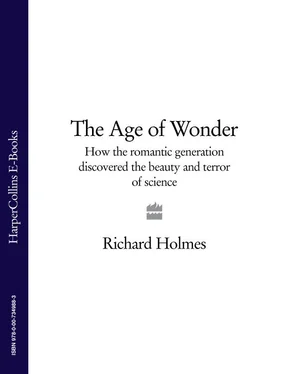At Greenwich, Maskelyne was stunned by the superior quality and light-gathering power of Herschel’s ‘home made’ mirrors. He immediately recognised that they were far more powerful than any of the official observatory telescopes, and probably than any other telescope in Europe. Maskelyne, reputed to be a jealous and illiberal man because of his supposed ill-treatment of the watchmaker John Harrison, behaved with great forthrightness and generosity to Herschel.
On 3 June 1782 Herschel wrote exuberantly to Caroline, casting aside his usual circumspect tone: ‘Dear Lina…The last two nights I have been star-gazing at Greenwich with Dr Maskelyne & Mr Aubert. We have compared our telescopes together and mine was found very superior to any at the Royal Observatory. Double stars they could not see with their instruments I had the pleasure to show them very plainly, and my [folding stand] mechanism so much approved of that Dr Maskelyne has already ordered a model to be taken from mine; and a stand to be made by it for his reflector. He is however now so much out of love with his instrument [a six-foot Newtonian] that he begins to doubt whether it deserves a new stand.’ 145
Banks (who had learned much about royal decorum since Tahiti) now knew that it was the perfect moment to introduce Herschel formally to the King at Windsor in May 1782. The meeting between the two Hanoverians (commoner and king, but both firmly speaking English) was a great success. Members of the King’s Hanoverian entourage had already heard of the Herschel brothers as talented musicians, and His Majesty was intrigued by the change in métier. 146 King George, not yet mad, was renowned for his aphoristic remarks to his more talented subjects. To Edward Gibbon, for example, still deep in his six-volume history The Decline and Fall of the Roman Empire, he had observed archly: ‘Scribble, scribble, scribble, eh, Mr Gibbon?’ It was said that the King now murmured to Banks: ‘Herschel should not sacrifice his valuable time to crotchets and quavers. ’ 147
Herschel wrote swiftly to Caroline, with a note of growing excitement that had never previously appeared in his letters. ‘Among Opticians and Astronomers nothing is now talked of but what they call my great discoveries. Alas! This shows how far they are behind, when such trifles as I have seen and done are called great. Let me but get at it again! I will make such telescopes & see such things-that is, I will endeavour to do so.’ 148 In a later note, again using her intimate diminutive name, he added: ‘You see Lina I tell you all these things, you know vanity is not my foible therefore I need not fear your Censure.’ 149 He would not have feared his sister’s censure a decade before.
Banks was determined to find his new astronomical protégé a salary, and if possible a suitable place. This required some diplomacy, as university professorships were for mathematicians, the post of Astronomer Royal was evidently taken, and the new post of Royal Astronomer at Kew Gardens had recently been promised to another-‘a devil of a pity’. With Banks’s diplomatic nudging, the King agreed that Herschel should give up teaching music in Bath, and move to a house near Windsor, to concentrate entirely on astronomy. To achieve this, His Majesty would be pleased to create a new official post, appointing Herschel as the King’s Personal Astronomer at Windsor on a salary of £200 per annum. (This was not particularly generous, but then the Astronomer Royal received only £300.) At the age of forty-three, Herschel’s second career had burst into life.
After the very briefest consultation, Herschel, Caroline and their brother Alexander moved on 31 July 1782 to a large, sprawling house in the village of Datchet, positioned deep in the countryside between Slough and Windsor, just south of the river Thames. The house had large grass plots suitable for erecting telescopes, and several stables and outbuildings for the furnaces and the grinding and polishing equipment. An old laundry could be converted into an observation building. But the house itself had not been inhabited for several years, and was cold and damp. Caroline set about the huge task of cleaning and repairing. 150
Almost immediately Herschel was commanded to bring his famous seven-foot telescope to Windsor, where it was reassembled on the terrace for everyone to view the planets. Herschel was a particular success with the three teenaged royal princesses, Charlotte, Augusta and Elizabeth. On one cloudy evening (it being an English summer) when viewing was impossible, he had the inspired idea of constructing pasteboard models of Jupiter and its four moons, and Saturn and its rings, and hanging them-illuminated by candles-from a distant garden wall on the Windsor estate. These were meticulously prepared beforehand. By ingeniously focusing down the seven-foot, he was able to show these models to the three young girls through the telescope, an early form of outdoor planetarium. 151
Many other children of the new generation also grew up understanding the cosmos in a new way. Discovering the stars became a particular and special moment of self-discovery. The poet Coleridge remembered being taken out at night into the fields by his beloved father, the vicar and schoolmaster of Ottery St Mary in Devon, in the winter of 1781 to be shown the night sky. Coleridge was only eight, but he never forgot it. Perhaps the Reverend John Coleridge, a great follower of the monthly magazines (to which he sometimes contributed learned articles on Latin grammar), had recently read of Georgium Sidus. At all events, Coleridge treasured the memory of his father’s eager demonstration of the stars and planets overhead, and the possibility of other worlds: ‘I remember, that at eight years old I walked with him one evening from a farmer’s house, a mile from Ottery-& he told me the names of the stars-and how Jupiter was a thousand times larger than our world-and that the other twinkling stars were Suns that had worlds rolling round them-& when I came home, he showed me how they rolled round. I heard him with profound delight & admiration; but without the least mixture of Wonder or incredulity. For from my early reading of Faery Tales, & Genii etc etc-my mind had been habituated to the Vast. ’ 152
Such a huge, starlit prospect, inhabited by giant planets and remote classical gods, might have puzzled or alarmed a normal eight-year-old. But the striking thing is that Coleridge, who wrote many letters about his childhood and always remembered it acutely, said he felt no surprise or disbelief at all-‘not the least mixture of Wonder or incredulity’-about this revelation of the enormous scale of the universe. He felt himself already tuned to the size and mystery of the new cosmos. His Romantic sensibility-even at the age of eight-already inhabited the infinite and the inexplicable. Cosmological imagery, and especially the symbolic movement of the stars and the moon, entered deeply into his early poetry, and in a sense it came to rule the world of the Ancient Mariner and his ship.
The moving Moon went up the sky,
And nowhere did abide;
Softly she was going up,
And a star or two beside.
Her beams bemocked the sultry main,
Like April hoar-frost spread,
But where the ship’s huge shadow lay,
The charmed water burnt alway
A still and awful red. 153
The prose gloss that Coleridge added to this passage almost twenty years later (1817) takes on a new resonance when compared with what we now know of Herschel’s long nights of lunar observation:
In his loneliness and fixedness he yearneth towards the journeying Moon, and the stars that still sojourn, yet still move onward; and every where the blue sky belongs to them, and is their appointed rest, and their native country and their own natural homes, which they enter unannounced, as Lords that are certainly expected and yet there is silent joy at their arrival. ♣
Читать дальше












